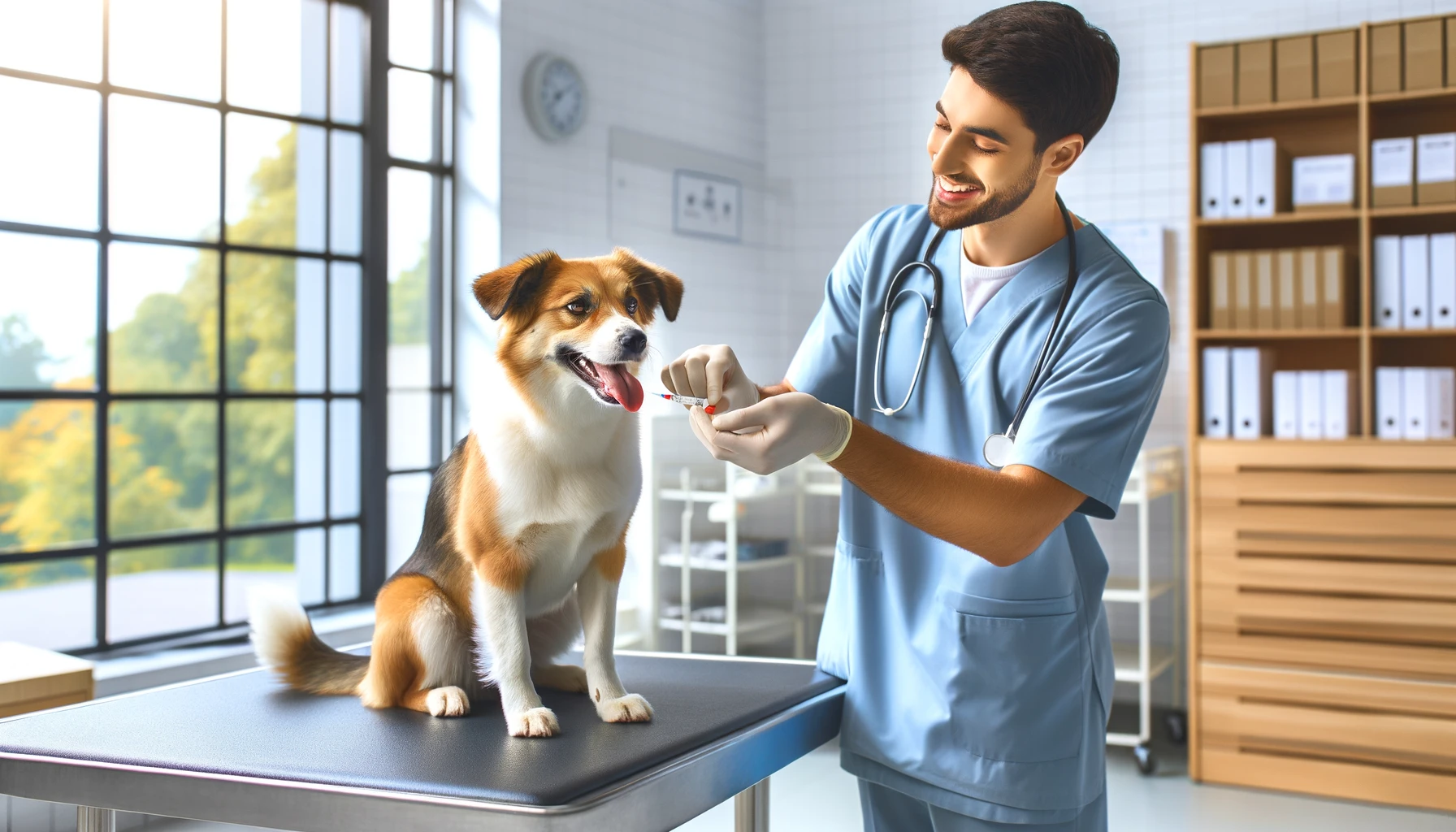Discover the key to unlocking the secrets of your dog's health concerns.
In this comprehensive guide, we'll delve into the most common skin issues, digestive problems, dental health, allergies, joint and mobility issues, obesity, behavioral challenges, and parasites that can affect your furry friend.
With evidence-based insights and practical solutions, you'll gain a deeper understanding of your canine companion's well-being and be equipped to provide the best care possible.
Get ready to unravel the mysteries of canine health and ensure a happier, healthier life for your beloved pet.
Key Takeaways
- Itchy skin in dogs can be caused by allergies, parasites, dry skin, or underlying health conditions. It should be treated to prevent complications like infection.
- Allergies in dogs can manifest as skin irritations, respiratory symptoms, or digestive issues. Allergy testing can help identify specific allergens affecting your dog.
- Digestive problems in dogs should be addressed by implementing dietary changes recommended by a veterinarian. Natural remedies like ginger and peppermint can also be explored.
- Regular dental care, including brushing your dog's teeth and providing dental chews or toys, is crucial for maintaining their dental health. Regular check-ups with a veterinarian are important for early detection and treatment.
Common Skin Issues in Dogs
If you notice that your dog has developed one or more skin issues, it's important to address them promptly. Skin problems can cause discomfort and distress to your furry friend, so understanding and treating these issues is crucial for their overall well-being.
Two common skin issues that dogs often experience are itchy skin and hot spots.
Itchy skin, also known as pruritus, is a prevalent problem in dogs. It can be caused by a variety of factors, including allergies, parasites, dry skin, or underlying health conditions. Dogs with itchy skin may scratch, lick, or chew at their skin excessively, leading to further irritation and potential skin damage. If left untreated, itchy skin can result in infection and other complications.
Hot spots, also called acute moist dermatitis, are another common skin issue in dogs. These are localized areas of inflamed and infected skin that appear red, moist, and painful. Hot spots can develop quickly, often as a result of underlying allergies, flea bites, or excessive licking and chewing. If not addressed promptly, hot spots can worsen, leading to further discomfort and the need for more intensive treatment.
To effectively address itchy skin and hot spots in dogs, it's essential to determine the underlying cause of the problem. This may involve a thorough examination by a veterinarian, diagnostic tests, and a treatment plan tailored to your dog's specific needs. Treatment options may include medication to relieve itching, topical creams or ointments to soothe the skin, and addressing any underlying allergies or infections.
Digestive Problems and Solutions
Addressing digestive problems is crucial in maintaining your dog's overall health and well-being. Here are four important steps you can take to help alleviate and manage digestive issues in your canine companion:
- Identify the underlying cause: Digestive problems in dogs can stem from a variety of factors, including food allergies, intolerances, or infections. Consult with your veterinarian to determine the root cause of your dog's digestive issues.
- Implement dietary changes: Once the cause has been identified, your vet may recommend dietary modifications. These changes can include switching to a hypoallergenic or limited ingredient diet, avoiding certain ingredients that trigger digestive issues, or adding probiotics to promote a healthy gut flora.
- Explore natural remedies: In addition to dietary changes, there are several natural remedies that can aid in managing digestive problems. For example, ginger and peppermint have been known to soothe upset stomachs, while slippery elm can help reduce inflammation in the digestive tract. Always consult with your vet before incorporating any natural remedies into your dog's treatment plan.
- Monitor and adjust: Keep a close eye on your dog's digestive health and make any necessary adjustments to their diet or treatment plan. Regular monitoring will help you identify any potential triggers or changes in their condition.
Dental Health and Care Tips
To maintain your dog's dental health and prevent potential issues, it's important to prioritize regular dental care. Just like humans, dogs also require proper dental hygiene to prevent tooth decay and other dental problems. Neglecting your dog's dental health can lead to discomfort, pain, and even more serious health issues.
To ensure your dog's dental hygiene, it's recommended to brush their teeth regularly. Ideally, you should brush your dog's teeth daily, but if that's not possible, aim for at least three times a week. Use a toothbrush and toothpaste specifically designed for dogs, as human toothpaste can be harmful to them. Additionally, providing your dog with dental chews or toys can help remove plaque and tartar buildup.
Preventing tooth decay in dogs also involves paying attention to their diet. Feeding your dog a balanced diet that includes high-quality dog food and avoiding sugary treats can significantly reduce the risk of dental issues. Regular dental check-ups with a veterinarian are also crucial to identify any dental problems early on and provide appropriate treatment.
Understanding Allergies in Canines
Allergies in canines can cause a range of symptoms and discomfort for your dog. It's important to understand the signs of canine allergy symptoms and how allergy testing in dogs can help identify the specific allergens affecting your furry friend. Here are four key points to consider:
- Common Symptoms: Canine allergy symptoms can manifest in various ways, including skin irritations like itching, redness, and rashes. Your dog may also experience respiratory symptoms such as sneezing, coughing, or wheezing. Digestive issues like vomiting and diarrhea can also be signs of allergies.
- Environmental Allergens: Dogs can develop allergies to a wide range of environmental factors, including pollen, dust mites, mold, and certain plants. Identifying these allergens through testing can help you better manage your dog's exposure and minimize their symptoms.
- Food Allergies: Some dogs may have allergies to specific ingredients in their food, such as grains, dairy, or certain proteins. Allergy testing can help pinpoint the problematic components, allowing you to choose an appropriate diet for your dog.
- Allergy Testing Options: There are different methods of allergy testing in dogs, including blood tests and skin patch tests. These tests can provide valuable insights into the allergens affecting your dog, enabling you to take the necessary steps to alleviate their discomfort.
Dealing With Joint and Mobility Issues
If your canine companion is experiencing joint and mobility issues, it's important to take proactive steps to prevent further problems and manage their current restrictions.
This can include regular exercise tailored to their abilities, maintaining a healthy weight to reduce stress on their joints, and providing a comfortable and supportive environment.
Additionally, consulting with a veterinarian to explore potential treatments such as medication or physical therapy can help improve your dog's mobility and overall quality of life.
Preventing Joint Problems
You can prevent joint problems and effectively deal with joint and mobility issues in your canine companion. Here are some evidence-based recommendations to help keep your dog's joints healthy:
- Maintain a healthy weight: Excess weight puts strain on your dog's joints, increasing the risk of injuries and joint problems. Feed a balanced diet and monitor portion sizes to prevent obesity.
- Regular exercise: Engage your dog in regular, low-impact exercise to strengthen muscles and promote joint health. Activities like swimming and walking are excellent options. Avoid high-impact activities that can be hard on the joints, especially in dogs prone to joint issues.
- Provide joint supplements: Consult with your veterinarian about the use of joint supplements such as glucosamine and chondroitin. These supplements can help support joint health and prevent degenerative conditions.
- Regular check-ups: Schedule regular veterinary check-ups to monitor your dog's joint health. Early detection and intervention can prevent the progression of joint problems and ensure prompt treatment if needed.
Managing Mobility Restrictions
To effectively manage mobility restrictions in your canine companion, focus on implementing targeted strategies for joint and mobility issues.
Arthritis pain can significantly impact your dog's mobility, causing discomfort and limiting their ability to move freely. To manage arthritis pain, consult with your veterinarian for appropriate pain management medications.
Additionally, incorporating exercises for improved mobility can be beneficial. Low-impact exercises such as swimming and walking on soft surfaces can help strengthen the muscles around the joints and improve your dog's range of motion. Physical therapy and hydrotherapy sessions may also be recommended by your veterinarian to further aid in managing mobility restrictions.
Remember to always consult with a professional to develop a tailored plan for your dog's specific needs.
Recognizing and Managing Obesity
Recognizing and managing obesity in your canine companion is crucial for their overall health and well-being.
To prevent obesity, it's important to implement strategies such as portion control, regular exercise, and providing a balanced diet.
Obesity in dogs can lead to a myriad of health risks, including joint problems, diabetes, heart disease, and decreased lifespan.
Effective weight management through proper nutrition and exercise is essential to ensure a healthy and happy life for your furry friend.
Obesity Prevention Strategies
To effectively manage and prevent obesity in your canine companion, it's important to regularly assess their weight and implement appropriate strategies. Here are four obesity prevention strategies that can help ensure effective weight management for your furry friend:
- Balanced Diet: Provide a well-balanced diet that meets your dog's nutritional needs. Consult with your veterinarian to determine the right amount and type of food to serve, taking into consideration their age, breed, and activity level.
- Portion Control: Measure your dog's food accurately to avoid overfeeding. Use a measuring cup instead of eyeballing it, as even small deviations can lead to weight gain over time.
- Regular Exercise: Engage your dog in regular physical activity to burn calories and maintain a healthy weight. Daily walks, playtime, and interactive toys can help keep them active and prevent weight gain.
- Treat Moderation: Limit the number and size of treats given to your dog. Treats should make up no more than 10% of their daily caloric intake. Opt for healthier alternatives like carrot sticks or small pieces of lean protein.
Health Risks of Obesity
To effectively manage and prevent obesity in your canine companion, it's crucial to understand the health risks associated with obesity and take appropriate measures to recognize and manage it.
Obesity in dogs can lead to a range of serious health problems. Firstly, overweight dogs are at a higher risk of developing cardiovascular diseases such as hypertension and heart failure. Excessive weight also puts strain on their joints, increasing the likelihood of developing arthritis and other musculoskeletal issues. Additionally, obese dogs are more prone to respiratory problems, including difficulty breathing and decreased lung capacity. Obesity can also lead to metabolic disorders such as diabetes mellitus.
Effective Weight Management
To effectively manage and prevent obesity in your canine companion, you need to implement effective weight management strategies. Here are four key strategies to help you achieve this goal:
- Canine Exercise: Regular physical activity is essential for maintaining a healthy weight in dogs. Engage in daily walks, play fetch, or take your furry friend for a run. Not only will exercise burn calories, but it will also keep your dog mentally stimulated and improve overall well-being.
- Portion Control: Be mindful of the amount of food you're feeding your dog. Measure out appropriate portions based on their size, age, and activity level. Avoid overfeeding and limit treats, as excess calories can lead to weight gain.
- Balanced Diet: Provide your dog with a well-balanced diet that meets their nutritional needs. Opt for high-quality dog food that's rich in lean proteins, fiber, and essential vitamins and minerals. Avoid feeding them table scraps or human food, as these can be high in calories and unhealthy for dogs.
- Regular Vet Check-ups: Schedule regular visits to the veterinarian to monitor your dog's weight and overall health. Your vet can provide guidance on appropriate weight management techniques and help tailor a plan specific to your dog's needs.
Behavioral Health Challenges in Dogs
When dealing with behavioral health challenges in dogs, it's important to understand their underlying causes and address them promptly. Canine anxiety and aggression in dogs are two common behavioral issues that can greatly impact their overall well-being and quality of life.
Canine anxiety refers to a state of fear or unease that dogs experience in certain situations, such as separation anxiety or noise phobias. This can manifest in behaviors like excessive barking, destructive chewing, or even aggression.
Aggression in dogs, on the other hand, can be directed towards humans, other animals, or even objects. It's crucial to identify the triggers and root causes of aggression in order to develop effective management strategies.
Both canine anxiety and aggression can be influenced by a variety of factors, including genetics, early socialization experiences, and environmental stressors. Addressing these challenges often requires a multifaceted approach, involving behavior modification techniques, positive reinforcement training, and sometimes even medication.
Seeking the guidance of a professional dog behaviorist or veterinarian is recommended to ensure a comprehensive and tailored approach to managing these behavioral health challenges in dogs.
Preventing and Treating Parasites
Prevent and treat parasites to ensure your dog's overall well-being and quality of life. Parasites can cause a range of health issues in dogs, from mild discomfort to severe illness. Here are four important steps you can take for effective parasite prevention and treatment:
- Regularly administer preventive medications: Consult with your veterinarian to determine the most suitable preventive medication for your dog. These medications can protect against fleas, ticks, heartworms, and intestinal parasites. Administer them according to the recommended schedule to ensure continuous protection.
- Keep your dog's living environment clean: Regularly clean and vacuum your home, as well as your dog's bedding and toys. This helps to eliminate any parasites or their eggs that may be lurking in the environment. Additionally, regularly remove feces from your yard to prevent the spread of intestinal parasites.
- Practice good hygiene: Wash your hands thoroughly after handling your dog, especially if you suspect they may have come into contact with parasites. This can help prevent the transmission of parasites to humans and other animals.
- Seek prompt treatment if parasites are detected: If you notice any signs of parasites, such as itching, hair loss, or changes in appetite, consult your veterinarian immediately. They can recommend the appropriate treatment to eliminate the parasites and alleviate your dog's discomfort.
Frequently Asked Questions
What Are Some Common Causes of Skin Issues in Dogs?
Common causes of skin issues in dogs include allergies, parasites, infections, and hormonal imbalances. To treat these issues, common treatments include medicated shampoos, antihistamines, antibiotics, and hormone therapy. Canine skin allergies can be managed through identifying and avoiding allergens, and using medications like antihistamines or immunotherapy.
How Can I Prevent Digestive Problems in My Dog?
To prevent digestive problems in your dog, incorporate preventive measures and dietary interventions. Ensure a balanced diet, provide regular exercise, and avoid sudden changes in food. Consult your vet for specific recommendations.
What Are Some Signs of Dental Health Issues in Dogs?
To identify dental health issues in your dog, look for signs such as bad breath, yellow or brown teeth, swollen gums, and difficulty eating. Preventive measures like regular brushing and professional cleanings can help, while treatment options include dental surgeries and antibiotics.
How Can I Determine if My Dog Has Allergies and What Can I Do to Help?
To determine if your dog has allergies, look for symptoms like itching, sneezing, and gastrointestinal issues. Consult with a veterinarian for a proper diagnosis. Helping dogs with allergies may involve allergen avoidance, medication, and specialized diets.
Are There Any Natural Remedies or Treatments for Joint and Mobility Issues in Dogs?
You can explore natural supplements and alternative therapies to address joint and mobility issues in dogs. These options may offer relief and support for your furry friend's health and well-being.
Conclusion
In conclusion, understanding and addressing the various health concerns that can affect our canine companions is crucial for their overall well-being. By recognizing common skin issues, digestive problems, dental health, allergies, joint and mobility issues, obesity, and behavioral health challenges, we can better prevent and manage these conditions.
Regular vet check-ups, proper nutrition, exercise, and preventive measures against parasites are all essential in keeping our dogs healthy and happy. It's our responsibility as pet owners to provide them with the care they need to live a vibrant and fulfilling life.






